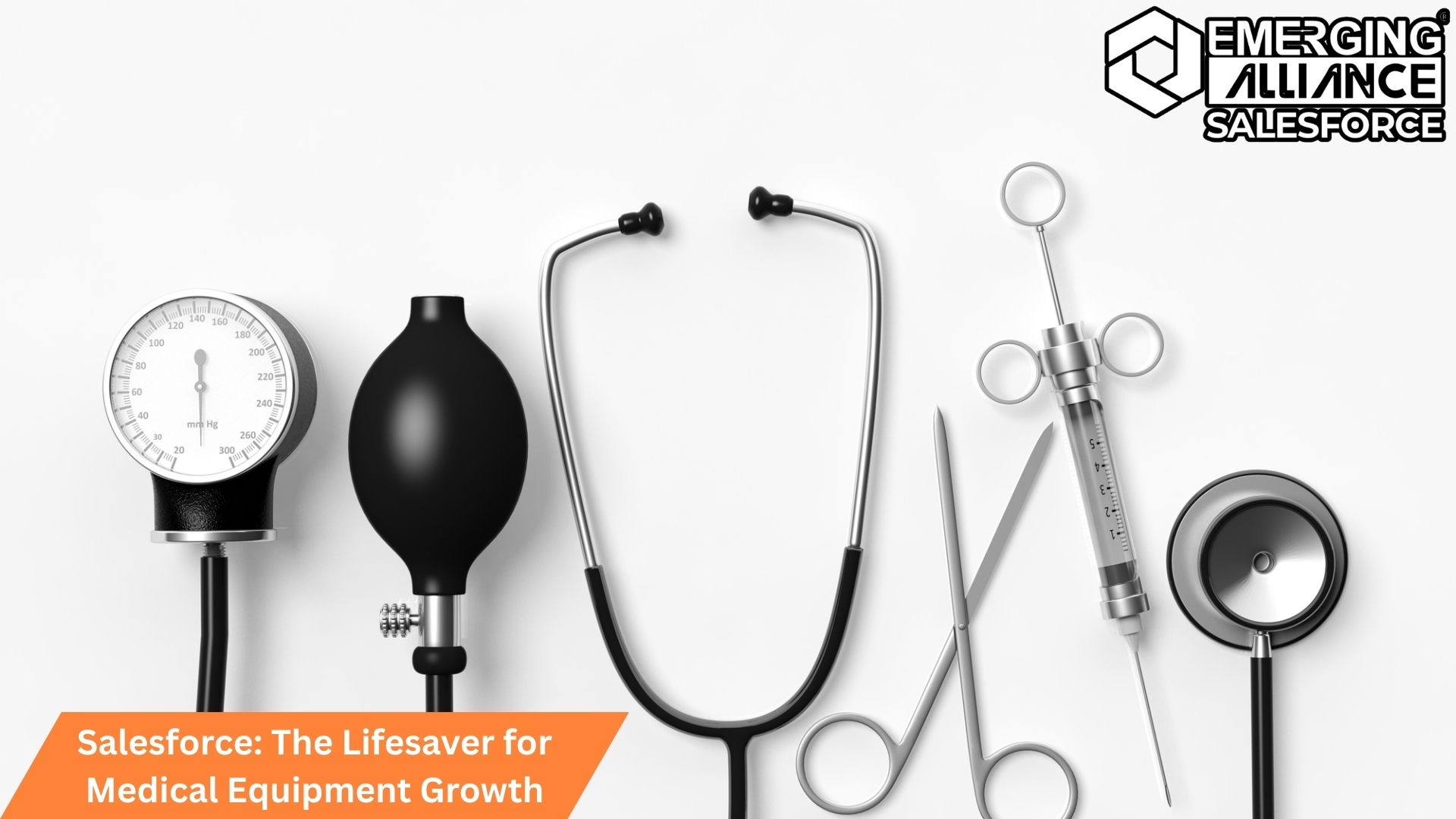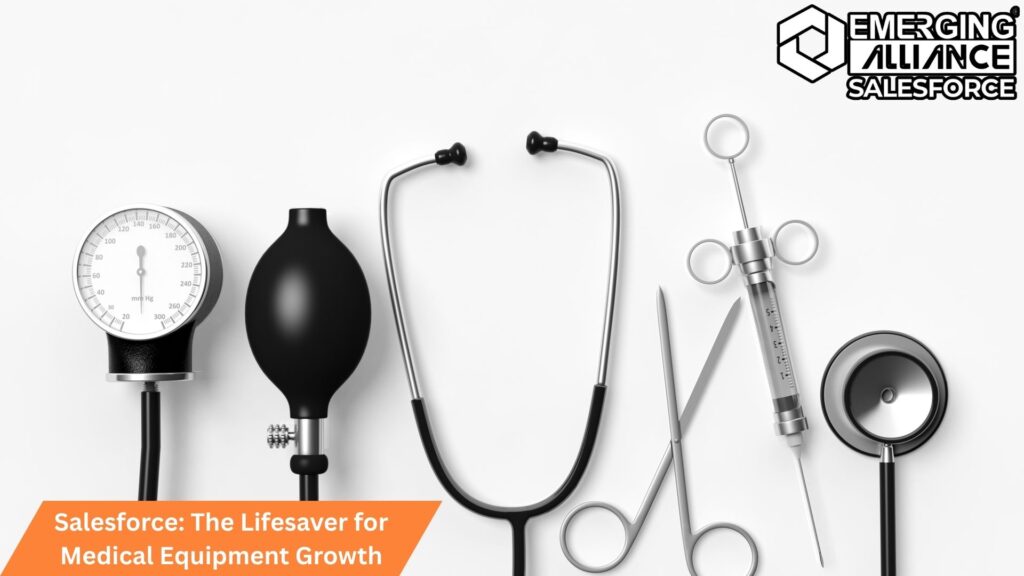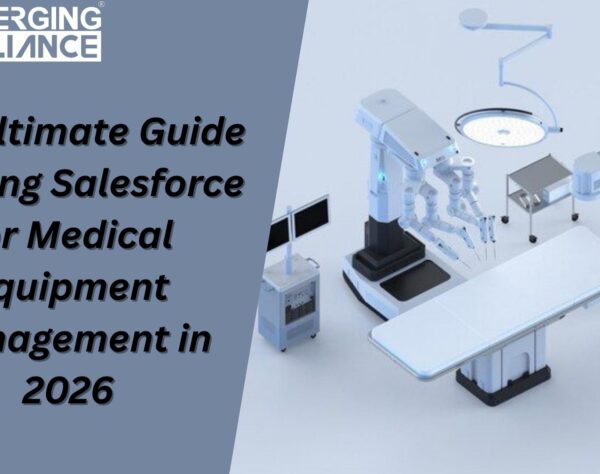
Salesforce: The Lifesaver for Medical Equipment Growth

Salesforce: The Ultimate Lifeline for Medical Equipment Growth
The medical equipment industry is a dynamic and rapidly evolving space where precision, compliance, and customer satisfaction play a critical role. As healthcare providers demand better service and faster response times, medical equipment providers must adapt by streamlining their operations, enhancing customer experiences, and ensuring strict regulatory compliance.
Enter Salesforce — the industry-leading CRM platform that empowers medical equipment companies to manage their customer relationships, automate complex sales processes, and unlock valuable insights that drive growth. With its suite of intelligent tools, Salesforce CRM transforms how medical equipment providers manage their pipelines, strengthen client relationships, and maintain compliance while scaling operations.
Whether you’re a manufacturer, distributor, or service provider, adopting Salesforce can revolutionize your business by offering seamless integration across departments, ensuring customer retention, and helping your sales team close deals faster. Let’s explore how Salesforce CRM serves as the lifeline that drives unparalleled growth in the medical equipment industry.
Why Medical Equipment Companies Need Salesforce CRM Now More Than Ever
1. Centralizing Customer Data to Create a 360° Customer View
In the medical equipment sector, companies often engage with diverse clients, including hospitals, clinics, and healthcare providers, each with specific requirements and purchasing behaviors. Without a centralized system, managing customer interactions can become chaotic and lead to miscommunication.
Salesforce CRM consolidates all customer information in a single platform, offering a 360-degree view of interactions, purchase history, service requests, and preferences. This ensures that sales, marketing, and customer service teams have real-time access to customer data, enabling seamless communication and personalized engagement.
✅ Example: A leading medical device distributor used Salesforce to unify customer data, reducing response time by 22% and boosting customer satisfaction.
2. Automating Lead Management and Accelerating Conversions
The medical equipment industry involves complex sales cycles with multiple touchpoints and decision-makers. Managing leads manually often results in delays and missed opportunities. Salesforce Sales Cloud automates lead capture, scoring, and assignment, ensuring that qualified leads are routed to the right sales reps for faster follow-ups.
Moreover, Salesforce’s AI-powered Einstein Analytics predicts which leads are most likely to convert, allowing sales teams to prioritize high-value prospects. Automated workflows ensure that no lead slips through the cracks, resulting in higher conversion rates and increased revenue.
✅ Success Story: A medical device manufacturer saw a 28% increase in lead conversions after automating its lead management process with Salesforce.
3. Enhancing Customer Retention with Personalized Service
For medical equipment providers, retaining existing clients is just as crucial as acquiring new ones. Salesforce Service Cloud ensures superior customer service by equipping support teams with the tools needed to provide timely and personalized responses.
Through AI-driven insights and case management features, Salesforce enables service teams to address customer queries, manage warranty claims, schedule maintenance, and resolve issues efficiently. Proactive alerts also help prevent equipment failures, ensuring customer satisfaction and strengthening long-term relationships.
✅ Highlight: Medical equipment companies leveraging Salesforce Service Cloud reported a 30% improvement in customer satisfaction and loyalty.
4. Ensuring Regulatory Compliance and Mitigating Risks
Compliance is non-negotiable in the medical equipment industry, where adherence to regulations such as HIPAA, FDA, and ISO standards is mandatory. Salesforce Health Cloud provides robust compliance management capabilities that automate documentation, track audit trails, and generate reports for regulatory bodies.
By maintaining an immutable record of every interaction and ensuring data security, Salesforce reduces the risk of non-compliance, safeguarding businesses from fines and reputational damage. It also allows companies to automate product recall procedures, ensuring compliance with safety standards.
✅ Case Study: A leading surgical equipment provider reduced compliance-related errors by 40% after adopting Salesforce Health Cloud.
5. Accelerating Sales Cycles with CPQ Automation
Creating accurate quotes and managing complex pricing structures can be time-consuming, often delaying deal closures. Salesforce CPQ (Configure, Price, Quote) streamlines the quoting process by automating product configurations, discount approvals, and contract management.
With Salesforce CPQ, sales teams can generate customized quotes within minutes, reducing administrative overhead and accelerating the sales cycle. Additionally, Salesforce CPQ ensures pricing accuracy, minimizing errors and improving customer satisfaction.
✅ Insight: Medical equipment providers who implemented Salesforce CPQ reduced quoting errors by 35% and achieved a 20% faster deal closure rate.
How Salesforce Empowers Medical Equipment Companies to Achieve Sustainable Growth
1. Data-Driven Decision-Making with Predictive Analytics
Medical equipment providers can no longer rely on guesswork to drive growth. Salesforce CRM leverages Einstein AI to analyze historical sales data, forecast trends, and provide actionable insights. These predictive analytics enable medical equipment companies to make informed decisions about inventory management, pricing strategies, and market expansion.
✅ Example: A medical device company improved inventory turnover by 18% after adopting Salesforce’s predictive analytics tools.
2. Personalized Marketing Campaigns for Targeted Outreach
In the medical equipment industry, generic marketing campaigns often fail to resonate with healthcare providers who seek tailored solutions. Salesforce Marketing Cloud enables businesses to segment their audience, create personalized content, and execute targeted marketing campaigns.
With dynamic customer journeys and personalized communication, Salesforce Marketing Cloud increases engagement, boosts conversion rates, and strengthens brand loyalty.
✅ Case Study: A medical supplies company reported a 26% increase in engagement rates after implementing Salesforce Marketing Cloud to tailor its outreach strategies.
3. Seamless Integration with Third-Party Systems
The medical equipment industry relies on various systems, including ERP, billing, inventory, and supply chain management. Salesforce seamlessly integrates with these platforms, creating a unified ecosystem where data flows effortlessly between departments.
With real-time synchronization between Salesforce and ERP systems, medical equipment companies can ensure that all teams — from sales to fulfillment — operate with accurate, up-to-date information, enhancing overall operational efficiency.
✅ Highlight: A medical device distributor reduced operational inefficiencies by 24% after integrating Salesforce with its existing ERP system.
4. Proactive Warranty and Maintenance Management
Medical equipment often requires regular maintenance and warranty tracking to ensure optimal performance. Salesforce Service Cloud automates warranty renewals, sends maintenance reminders, and tracks service history, ensuring equipment uptime and preventing costly downtime.
By proactively managing warranties and service schedules, medical equipment providers can strengthen customer relationships and maintain long-term client satisfaction.
✅ Success Story: A diagnostic equipment manufacturer increased customer retention by 15% after automating warranty and maintenance management through Salesforce.
The Salesforce Advantage: Why It’s the Best Choice for Medical Equipment Providers
Unlike generic ERP systems, Salesforce CRM focuses on optimizing customer relationships, driving sales growth, and enhancing service quality. With its ability to centralize data, automate workflows, and provide real-time insights, Salesforce helps medical equipment companies achieve operational excellence and scale their businesses effortlessly.
Salesforce’s highly customizable platform adapts to the unique needs of medical equipment providers, enabling them to pivot quickly in response to market changes and technological advancements.
By embracing Salesforce CRM, medical equipment companies can gain a competitive edge, improve client satisfaction, and ensure sustained growth in a highly regulated and fast-paced industry.
Final Thoughts: Revolutionize Medical Equipment Growth with Salesforce
In an industry where innovation, compliance, and customer satisfaction dictate success, Salesforce CRM serves as the ultimate catalyst for growth in the medical equipment industry. By streamlining operations, enhancing customer relationships, and ensuring regulatory compliance, Salesforce empowers medical equipment providers to thrive in a competitive landscape.
From automating lead management to ensuring proactive maintenance schedules, Salesforce provides the tools necessary to stay ahead of the curve and deliver exceptional value to clients. If you’re ready to future-proof your business and achieve sustainable growth, Salesforce CRM is the lifeline your medical equipment company needs.
FAQs
1. How does Salesforce CRM improve lead management for medical equipment companies?
Salesforce automates lead capture, assignment, and follow-up, ensuring faster lead conversion and higher deal closures.
2. Can Salesforce help medical equipment companies comply with industry regulations?
Yes, Salesforce Health Cloud automates compliance documentation, generates audit-ready reports, and tracks regulatory adherence.
3. How does Salesforce enhance customer retention in the medical equipment industry?
Salesforce Service Cloud provides personalized customer support, proactive issue resolution, and efficient warranty management to improve retention.
4. Does Salesforce CPQ streamline quoting and pricing for medical equipment providers?
Absolutely. Salesforce CPQ automates product configurations, pricing approvals, and contract management, reducing errors and speeding up deal closures.
5. Can Salesforce integrate with ERP and other third-party systems?
Yes, Salesforce seamlessly integrates with ERP, billing, and inventory management systems to create a unified data ecosystem.
6. How does Salesforce Marketing Cloud help target healthcare providers effectively?
Salesforce Marketing Cloud segments audiences and personalizes outreach campaigns, increasing engagement and boosting conversions.
7. Is Salesforce scalable for growing medical equipment companies?
Yes, Salesforce is highly scalable and adapts to the expanding needs of medical equipment providers as they grow.
8. What role does Salesforce play in predictive analytics for medical equipment companies?
Salesforce leverages Einstein AI to analyze historical data, forecast trends, and provide actionable insights for informed decision-making.
9. Can Salesforce automate warranty management and maintenance for medical equipment?
Yes, Salesforce automates warranty tracking, renewal notifications, and service schedules to ensure equipment uptime.
10. Why is Salesforce a better choice for medical equipment companies compared to traditional ERP systems?
Salesforce focuses on customer relationship management and operational efficiency, while ERP systems primarily handle back-end processes.







